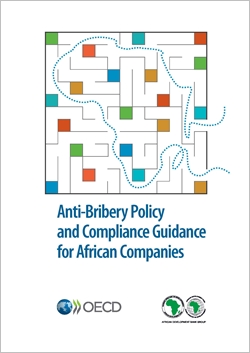Bribery and corruption
Business integrity and anti-bribery efforts in Africa: OECD/AfDB Initiative
OECD/AfDB Joint Initiative to Support Business Integrity and Anti-bribery Efforts in Africa
In 2008, the OECD and the African Development Bank (AfDB) launched a partnership to support African governments in their efforts to fight bribery and corruption. Twenty-one African countries are members of the Joint Initiative: Benin, Burkina Faso, Cameroon, Ethiopia, Ghana, Kenya, Madagascar, Malawi, Mali, Mauritania, Mozambique, Namibia, Niger, Nigeria, Rwanda, Senegal, Sierra Leone, South Africa, Tanzania, Uganda and Zambia. The Joint Initiative helps African countries in their fight against the bribery of public officials in business transactions and to improve corporate integrity and accountability, while promoting growth through an environment conducive to attracting foreign investment. The overall objectives of the Joint Initiative are to increase the capacity for effective anti-bribery enforcement, support international anti-bribery efforts, enhance public and private sector integrity, and contribute to transparent and accountable business conduct in Africa. These policies and standards are grounded in the anti-bribery and anti-corruption provisions of the African Union Convention on Preventing and Combating Corruption, the UN Convention Against Corruption, and the OECD Convention on Combating Bribery of Foreign Public Officials. Within a framework of strong African leadership, the OECD and AfDB are working together to design and implement effective measures to combat the bribery of public officials that draws from these international and regional instruments. Through the involvement of African business and industry, as well as policy makers, the Joint Initiative also focuses on providing technical support to Africa’s private sector to improve standards of corporate integrity and accountability. Indeed, while African economies are among the fastest-growing in the world, the perceived levels of corruption in the continent are hindering foreign investment and the ability of companies to conduct business fairly, and on a level playing field. MEETINGS Workshop on Fighting Corruption and Tackling Illicit Financial Flows from Africa, Abidjan, October 2016 Consultation of the Joint OECD AfDB Initiative, April 2014 1st Regional Experts’ Meeting of the Joint OECD/AfDB Initiative, Lilongwe
|
Activities of the Initiative
Roundtable on Engaging African SMEs in Corruption Prevention 5 December 2022 | Virtual event
A joint event between the African Development Bank and the OECD, this session looked ahead to the forthcoming OECD Toolkit for raising awareness and preventing corruption in SMEs and featured a discussion of how stakeholders in the region can more effectively engage African SMEs in the fight against corruption. Bringing together governments, international organisations, business organisations, companies and civil society, participants explored how best to tailor outreach measures and incentives to the specific needs of SMEs. They also considered the role of multilateral development banks in fostering engagement with African SMEs.
Roundtable on Corporate Anti-Corruption Compliance in Africa 14 April 2021 | Virtual event
The OECD and AfDB hosted a regional round table reviewing actions taken by African companies to promote corporate anti-bribery policy and related compliance measures. Bringing together business organisations and companies from African and OECD countries, panellists exchanged best practices, challenges and lessons learnt in addressing corporate integrity risks arising in particular from the COVID-19 crisis. DOCUMENTS AND LINKS
Anti-Bribery Policy and Compliance Guidance for African Companies, 2016 | version française OECD/AfDB Anti-Bribery and Business Integrity Course of Action (pdf) African Union Convention on Preventing and Combating Corruption Contact usElodie Beth, Senior Manager, Global Relations, OECD Anti-Corruption Division
|
Permanent url www.oecd.org/corruption/africa
Related Documents

